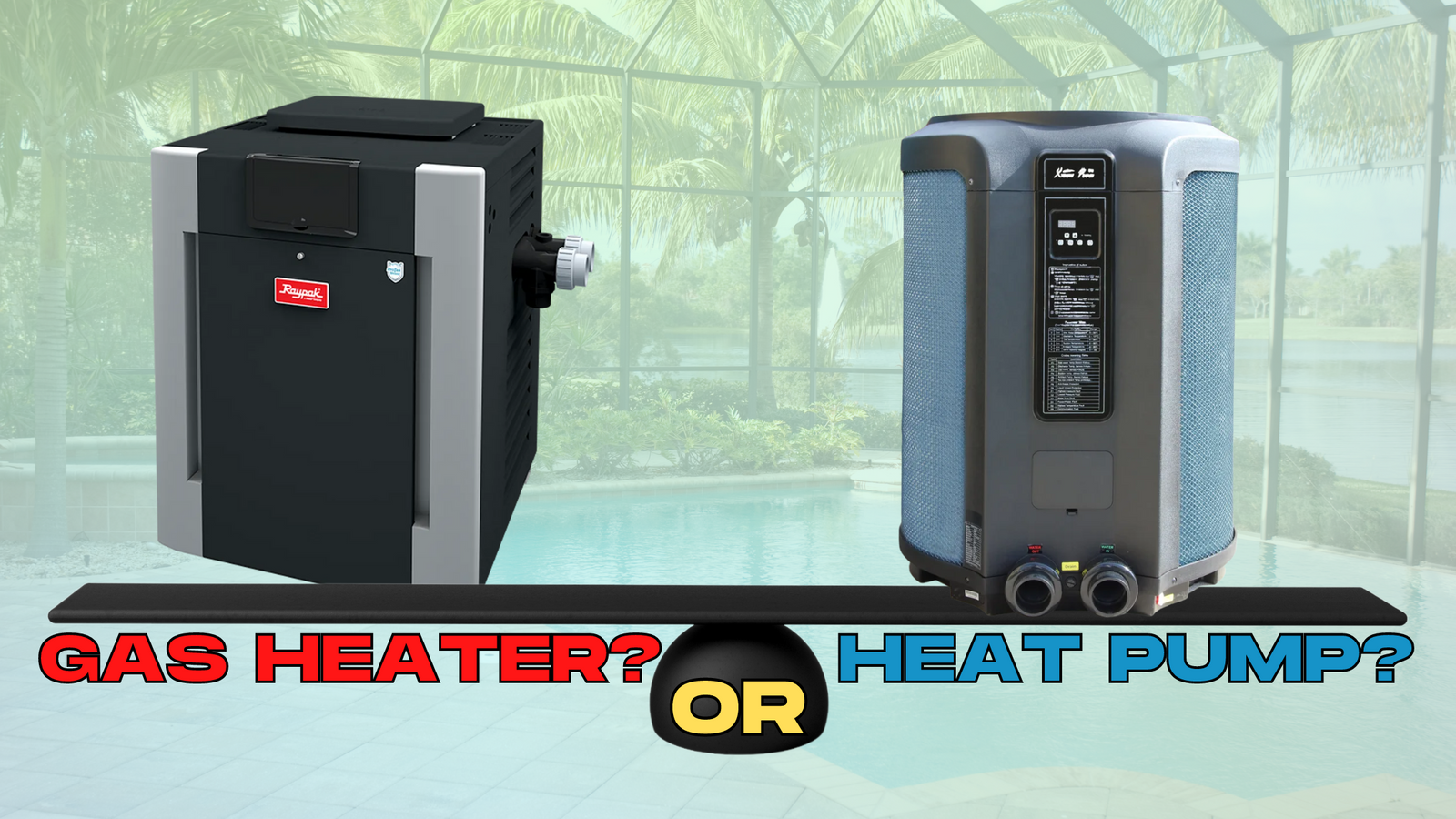Whether you have a personal backyard pool or you frequent a community or commercial pool, being able to use the pool during the colder months can greatly enhance your swimming experience. Pool heating allows you to take a dip in the water on a warm summer day, as well as on a cool autumn evening. It can also be beneficial for those who prefer to swim in warmer water or who have medical conditions that may be relieved by the buoyancy and warmth of the water. In this article, we will explore the different options for pool heating and the factors to consider when choosing a pool heater.
A gas heater and a heat pump are both types of pool heaters that are used to increase the temperature of the water in a swimming pool. However, they work in very different ways.
A gas heater uses natural gas or propane as fuel to generate heat. The heat is then transferred to the water as it passes through the heater. Gas heaters are known for their fast heating capabilities and are often used in colder climates where a heat pump may not be effective. However, they are generally less energy efficient than heat pumps and have a shorter lifespan. They also require more maintenance and have higher operating costs due to the cost of the fuel.
On the other hand, a heat pump uses electricity to move heat from the air or ground into the pool water. It works by using a refrigerant to absorb heat from the surrounding air or ground and then compress it to a higher temperature. This heat is then transferred to the pool water as it passes through the heat pump. Heat pumps are more energy efficient than gas heaters and have a longer lifespan. They are also easier to maintain and have lower operating costs. However, they may not be as effective in extremely cold climates and have a higher upfront cost.
Which is More Cost Effective?
These are some of the factors to consider when choosing a pool heater.
Climate and location: The climate and location of where the pool is located can have a significant impact on the effectiveness and efficiency of different types of pool heaters. For example, a heat pump may not be as effective in extremely cold climates, while a gas heater may be more suitable. On the other hand, a heat pump may be more energy efficient in warmer climates.
Pool size and usage: The size of the pool and how often it is used will also impact the type of heater that is best suited. A larger pool or one that is used frequently will require a more powerful heater to maintain a comfortable water temperature.
Energy efficiency: Energy efficiency is an important consideration, especially if you want to minimize your energy costs. A heat pump is generally more energy efficient than a gas heater, but it may have a higher upfront cost.
Initial cost and long-term expenses: The initial cost of the heater is also a factor to consider, as well as the long-term operating costs. While a heat pump may have a higher upfront cost, it may have lower operating costs over the long term due to its energy efficiency. On the other hand, a gas heater may have a lower upfront cost but higher operating costs due to the cost of the fuel. It's important to weigh the initial cost and long-term expenses when deciding on a pool heater.
Heat pumps are a popular choice for pool heating due to their energy efficiency and low operating costs. Here are some of the advantages and disadvantages of heat pumps:
Let’s take a deeper look at some of pros and cons of having a Heat Pump:
Heat pumps work by using a refrigerant to absorb heat from the surrounding air or ground and then compress it to a higher temperature. This heat is then transferred to the pool water as it passes through the heat pump. The pump also has a fan that helps circulate the air and a compressor that helps compress the refrigerant. The heat pump is connected to the pool's circulation system and is controlled by a thermostat to maintain the desired water temperature.
Advantages:
- Energy efficiency: Heat pumps use electricity to move heat from the air or ground into the pool water, making them more energy efficient than gas heaters.
- Low operating costs: Because they are energy efficient, heat pumps have lower operating costs compared to gas heaters.
- Long lifespan: Heat pumps have a longer lifespan than gas heaters, with many models lasting up to 15 years or more.
Disadvantages:
- May not work effectively in extremely cold climates: Heat pumps may not be as effective in extremely cold climates because they rely on the ambient air or ground temperature to provide heat.
- Higher upfront cost: Heat pumps have a higher upfront cost compared to gas heaters.
Now, Let’s Take a Look at Gas Heaters:
Gas heaters use natural gas or propane as fuel to generate heat. The heat is then transferred to the water as it passes through the heater. The heater has a burner that is ignited by a pilot light or electronic ignition and a heat exchanger that transfers the heat to the water. The gas heater is connected to the pool's circulation system and is controlled by a thermostat to maintain the desired water temperature.
Advantages:
- Fast heating: Gas heaters are known for their fast heating capabilities, making them a good choice for those who want to quickly heat up their pool.
- Can work in cold climates: Gas heaters can work effectively in cold climates because they generate their own heat.
Disadvantages:
- Higher operating costs: Gas heaters have higher operating costs compared to heat pumps due to the cost of the fuel (natural gas or propane).
- Shorter lifespan: Gas heaters have a shorter lifespan compared to heat pumps, with many models lasting only 5-10 years.
- More maintenance required: Gas heaters require more maintenance, such as regular cleaning and servicing, to ensure they are working properly.
So, Heat Pumps or Gas Heaters?
When comparing heat pumps and gas heaters for pool heating, there are several factors to consider, including cost, environmental impact, and ease of use and maintenance.
Cost comparison:
- Heat pumps have a higher upfront cost compared to gas heaters, but they have lower operating costs due to their energy efficiency. Over the long term, heat pumps may be more cost-effective compared to gas heaters.
- Gas heaters have a lower upfront cost compared to heat pumps, but they have higher operating costs due to the cost of the fuel.
Environmental impact:
- Heat pumps are generally more environmentally friendly than gas heaters because they use electricity as a source of energy and do not produce emissions.
- Gas heaters produce emissions due to the combustion of natural gas or propane, making them less environmentally friendly than heat pumps.
Ease of use and maintenance:
- Heat pumps are generally easier to use and maintain compared to gas heaters. They have fewer parts and require less maintenance, such as cleaning and servicing.
- Gas heaters require more maintenance, such as regular cleaning and servicing, to ensure they are working properly. They also have more parts that can potentially malfunction.
In conclusion, a heat pump and gas heater are both viable options for pool heating, but they have their own unique advantages and disadvantages. A heat pump is a better choice for those who prioritize energy efficiency and have a longer-term perspective, while a gas heater is a good option for those who want fast heating and don't mind higher operating costs.
It's important to consider the climate and location, pool size and usage, energy efficiency, initial cost, and long-term expenses when choosing a pool heater. It's also important to consider your personal needs and preferences, such as how often you plan to use the pool and your budget.
In general, a heat pump is a good choice for those who live in warmer climates and want to minimize their energy costs. A gas heater is a good choice for those who live in colder climates and want fast heating, or for those who don't mind higher operating costs.
Ultimately, the best type of pool heater for you will depend on your specific needs and circumstances. It's important to do your research and consider all of the factors before making a decision.

